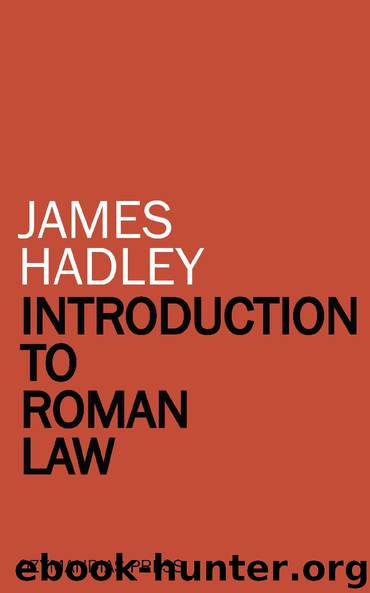Introduction to Roman Law by James Hadley

Author:James Hadley
Language: eng
Format: epub
Publisher: Pronoun
RIGHTS IN THE PROPERTY OF OTHERS.
JURA IN RE (SC. aliena ) were rights naturally included in the dominium of the owner, but cut off and given to some one else. One property might be so related to another, that the first was subject to some power or control of any person who owned the second: such relations were called servitutes praediorum rusticorum or urbanorum, according as they pertained to lands or to buildings. Among the former were three rights of way, viz., iter (of simple passing), actus (of driving animals), via (of keeping up a road), across the ground of another; also servitutes aquaeductus, aguaehaitstus, pascendi, arenae fodiendae, lapides eximendi, calcis coquendae, etc. Among the latter were servitutes oneris ferendi, tigni immissi, projiciendi or protegendi, stillicidii, fluminis, cloacae, luminum, altius non tollendi, ne luminibus (or prospectui ) officiatur. General principles: 1. The two estates must generally (not always) be contiguous; 2. The right secured must be an advantage to the ruling estate, not to its owner merely; 3. The advantage to the ruling estate was a measure of the right; 4. The servitus could never consist in faciendo (by owner of subject estate), but usually in patiendo, sometimes in non faciendo.
Besides the praedial, there were personal servitutes, pertaining to the person, and hence limited to the life, of an individual. The most important was the ususfructus, full right to use and enjoy some property of another. The property, however, must be put to its natural use; and must be so used as to suffer no substantial injury. Hence, in articles of food there could be no usufruct; and none in money ( quasi -usufruct). The usufruct might be created for a term of years, and must then cease at the end of the term. It might always be transferred from one person to another. But in no case could it survive the original usufructuary. And if by any transfer it came back to the owner of the property, if ceased at once. It might also cease by non-user (the opposite of usucapion).
There was a more restricted usufruct, called usus : the usuary could not transfer his right to a third party; and he could only use the property for immediate personal wants of himself and his family; all further use and profit belonged to the owner.
To the servitutes praedial and personal of the jus civile, the praetors added other jura in re. Thus—1. Superficies, a right (resembling usufruct, but of longer duration) in some building erected on the (surface) ground of another. Usually it was perpetual, and subject to transfer or inheritance without limit. If conditioned, as it commonly was, on a ground-rent, it ceased upon non-payment of the rent.
2. Emphyteusis, a similarly perpetual transferable and inheritable right in the land of another; developed in the later empire, and named from the planting of waste tracts which it was designed to promote. If the emphyteuta wished to sell his right, he must first offer it to the owner, who might buy it for the proposed price, or, if another bought it, might claim a fee.
Download
This site does not store any files on its server. We only index and link to content provided by other sites. Please contact the content providers to delete copyright contents if any and email us, we'll remove relevant links or contents immediately.
| Africa | Americas |
| Arctic & Antarctica | Asia |
| Australia & Oceania | Europe |
| Middle East | Russia |
| United States | World |
| Ancient Civilizations | Military |
| Historical Study & Educational Resources |
The Mysteries of Mithra by Cumont Franz(1352)
The Fall of Carthage by Adrian Goldsworthy(1307)
Sacred Britannia: The Gods and Rituals of Roman Britain by Aldhouse-Green Miranda(1149)
Letters from a Stoic (Classics) by Seneca(1034)
The Ghosts of Cannae: Hannibal and the Darkest Hour of the Roman Republic by Robert L. O'Connell(982)
Selected Political Speeches by Marcus Tullius Cicero(980)
The Satyricon by Petronius(975)
Fall of the Roman Republic (Penguin Classics) by Plutarch(962)
The Poison King: The Life and Legend of Mithradates, Rome's Deadliest Enemy by Adrienne Mayor(961)
Rubicon: The Triumph and Tragedy of the Roman Republic by Tom Holland(939)
Rome's Gothic Wars: From the Third Century to Alaric by Michael Kulikowski(933)
Hadrian and the Triumph of Rome by Everitt Anthony(880)
The Roman History by Cassius Dio(870)
In Defence of the Republic by Cicero(865)
Delphi Complete Works of Cicero by Cicero(818)
Letters from a Stoic by Seneca(812)
The Spartacus War by Strauss Barry(798)
Marcus Aurelius by John Sellars(793)
The Twelve Caesars (Penguin Classics) by Suetonius & Robert Graves(773)
